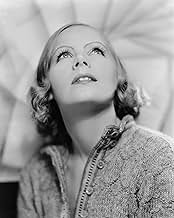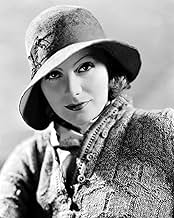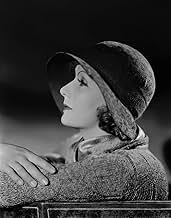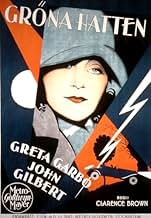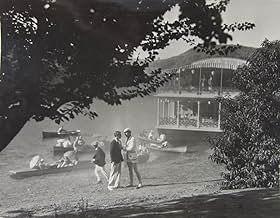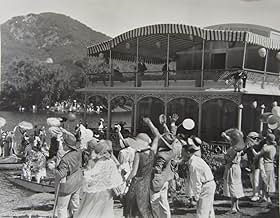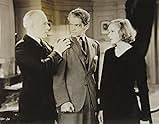IMDb-BEWERTUNG
7,1/10
1820
IHRE BEWERTUNG
Füge eine Handlung in deiner Sprache hinzuWhen two childhood sweethearts are kept from marrying, misery ensues.When two childhood sweethearts are kept from marrying, misery ensues.When two childhood sweethearts are kept from marrying, misery ensues.
- Für 1 Oscar nominiert
- 2 Gewinne & 1 Nominierung insgesamt
Johnny Mack Brown
- David Furness
- (as John Mack Brown)
Gertrude Astor
- Party Guest
- (Nicht genannt)
Agostino Borgato
- French Police Inspector
- (Nicht genannt)
F.F. Guenste
- Servant at Davids Death Investigation
- (Nicht genannt)
Sydney Jarvis
- Gendarme
- (Nicht genannt)
Fred Kelsey
- Detective
- (Nicht genannt)
Anita Louise
- Diana - as a Child
- (Nicht genannt)
Alphonse Martell
- French Hotel Concierge
- (Nicht genannt)
William H. O'Brien
- Man Peering Into Room
- (Nicht genannt)
Frank Finch Smiles
- Butler
- (Nicht genannt)
Empfohlene Bewertungen
There really was an art to silent film acting. It wasn't just all exaggerated facial expressions. That becomes clear when you see really good silent actors who know exactly how to put across the material.
Greta Garbo and John Gilbert are really, really good, and they sell the melodrama of "A Woman of Affairs" in a way that others couldn't. In the best of circumstances, films this old feel antiquated by today's standards, but "A Woman of Affairs" feels more sophisticated than other films of its type because of the subtle downplaying of Garbo and Gilbert. Garbo creates an actual woman responding to events that feel like they could actually happen to a real person rather than a stock character histrionically reacting to tear-jerking plot devices. She's fascinating to watch, conveying much with the lift of an eyebrow or a small hand gesture. Her performance here makes it clear why she had the stuff to make the transition to sound.
I have to give director Clarence Brown his due as well. There's a fluid, cinematic quality to this film that makes it feel far more mature than pretty much any of the early sound films coming out around the same time. For example, the film that won the Best Picture Oscar in the year of this film's release was "The Broadway Melody," a dreadful early sound film without a brain in its head. Compare that to the mature subject matter of "A Woman of Affairs" -- the homoerotic obsession one man has for another, for starters -- and you can see how much more daring late silents were than early talkies.
Bess Meredyth, credited in the opening titles with "continuity," received an Oscar nomination for Best Writing for her work on both this and another Clarence Brown film, 1929's "Wonder of Women," at the 1928-29 Oscars. This was during the time when the eligibility period for the Oscars was a wonky August 1 of one year through July 31 of the following year, and it wouldn't be until 1934 when the Academy changed the eligibility period to match the calendar year. This was also during that brief window of time when Oscar nominations could site work on multiple films, as Meredyth's writing nomination did.
Grade: A-
Greta Garbo and John Gilbert are really, really good, and they sell the melodrama of "A Woman of Affairs" in a way that others couldn't. In the best of circumstances, films this old feel antiquated by today's standards, but "A Woman of Affairs" feels more sophisticated than other films of its type because of the subtle downplaying of Garbo and Gilbert. Garbo creates an actual woman responding to events that feel like they could actually happen to a real person rather than a stock character histrionically reacting to tear-jerking plot devices. She's fascinating to watch, conveying much with the lift of an eyebrow or a small hand gesture. Her performance here makes it clear why she had the stuff to make the transition to sound.
I have to give director Clarence Brown his due as well. There's a fluid, cinematic quality to this film that makes it feel far more mature than pretty much any of the early sound films coming out around the same time. For example, the film that won the Best Picture Oscar in the year of this film's release was "The Broadway Melody," a dreadful early sound film without a brain in its head. Compare that to the mature subject matter of "A Woman of Affairs" -- the homoerotic obsession one man has for another, for starters -- and you can see how much more daring late silents were than early talkies.
Bess Meredyth, credited in the opening titles with "continuity," received an Oscar nomination for Best Writing for her work on both this and another Clarence Brown film, 1929's "Wonder of Women," at the 1928-29 Oscars. This was during the time when the eligibility period for the Oscars was a wonky August 1 of one year through July 31 of the following year, and it wouldn't be until 1934 when the Academy changed the eligibility period to match the calendar year. This was also during that brief window of time when Oscar nominations could site work on multiple films, as Meredyth's writing nomination did.
Grade: A-
'A Woman of Affairs' had a good deal going for it. It starred the always magical Greta Garbo. It had John Gilbert as her leading man, they always worked beautifully together in the four films they did together (starting with 'Flesh and the Devil' and finishing with 'Queen Christina') and Gilbert. It had Clarence Brown as director, he was not a consistent director as such but he was a sympathetic one with the right material. It had Douglas Fairbanks Jr in a more dramatic role. And it had Lewis Stone, another Garbo regular.
While not a great film as such, 'A Woman of Affairs' is a must for fans of Garbo who gives one of her best silent film performances. This is also a good representation of how well she and Gilbert worked together, and one of her better films with Brown as director. It is not a film for anybody who likes their stories realistic and more subtle, but for beautiful filming, emotional impact and good acting, 'A Woman of Affairs' is definitely worth seeing.
Is it perfect? No, and the story is the weak link. Not in a dull way, but it does get very melodramatic in the latter stages of the film and some parts are not just silly but sense and credulity go out of the window at times. Just didn't buy how some events happen as fast as they do here. The ending is both rushed and contrived.
Part of me did wish too that Gilbert's role was better developed and more interesting. Gilbert does very well with it but deserved more to do.
Garbo though is absolutely enchanting, she looks radiant and her presence is movingly noble and Diana's suffering portrayed with such graceful subtlety. Gilbert does well with what he has and he and Garbo match each other beautifully, never too restrained or overwrought and always sparkling. Stone is sincerely reserved as usual, while Fairbanks gives one of his better serious performances and is quite moving. Dorothy Sebastian sparkles. Brown directs sympathetically, no indifference here, and some of it is quite imaginative, the more symbolic moments not laid on too thick.
Despite the melodrama and silliness, there are many melancholic stretches handled with a lot of sincerity and not heavy-handedness and they come over as genuinely poignant and not over-bleak. 'A Woman of Affairs' is a very well made film and quite ravishingly photographed in the best moments. Carl Davis (known for writing compositions for many silent films much later on) provides a haunting and well fitting score, even if other scores of his for other films did better at enhancing the atmosphere, action etc.
Summing up, worth seeing for Garbo especially but didn't blow me away. 7/10
While not a great film as such, 'A Woman of Affairs' is a must for fans of Garbo who gives one of her best silent film performances. This is also a good representation of how well she and Gilbert worked together, and one of her better films with Brown as director. It is not a film for anybody who likes their stories realistic and more subtle, but for beautiful filming, emotional impact and good acting, 'A Woman of Affairs' is definitely worth seeing.
Is it perfect? No, and the story is the weak link. Not in a dull way, but it does get very melodramatic in the latter stages of the film and some parts are not just silly but sense and credulity go out of the window at times. Just didn't buy how some events happen as fast as they do here. The ending is both rushed and contrived.
Part of me did wish too that Gilbert's role was better developed and more interesting. Gilbert does very well with it but deserved more to do.
Garbo though is absolutely enchanting, she looks radiant and her presence is movingly noble and Diana's suffering portrayed with such graceful subtlety. Gilbert does well with what he has and he and Garbo match each other beautifully, never too restrained or overwrought and always sparkling. Stone is sincerely reserved as usual, while Fairbanks gives one of his better serious performances and is quite moving. Dorothy Sebastian sparkles. Brown directs sympathetically, no indifference here, and some of it is quite imaginative, the more symbolic moments not laid on too thick.
Despite the melodrama and silliness, there are many melancholic stretches handled with a lot of sincerity and not heavy-handedness and they come over as genuinely poignant and not over-bleak. 'A Woman of Affairs' is a very well made film and quite ravishingly photographed in the best moments. Carl Davis (known for writing compositions for many silent films much later on) provides a haunting and well fitting score, even if other scores of his for other films did better at enhancing the atmosphere, action etc.
Summing up, worth seeing for Garbo especially but didn't blow me away. 7/10
This is a beautifully crafted melodrama, well acted and with high MGM production values, but with moral values that nowadays may well be seen as belonging to another planet. Nevertheless once the historical perspective is in place this is still a simple timeless classic, one I've now seen a dozen times over the years.
Very honourable woman falls in love with equally honourable man, much to his even more honourable father's disfavour. You might notice that understanding "Honor" is the key to understanding this film! Garbo and Gilbert were perfect for the roles (making this a lovely bookend for Flesh And The Devil) and both never looked more gleaming beautiful, although Garbo had a few odd costumes along the way. They had a couple of languid clinches, but this time the plot got in the way of these scenes becoming "hot". Lewis Stone had already dropped into his avuncular stereotype here, his was a marvellously hammy but key performance. Everyone undulates their way to a fitting climax and conclusion (although didn't Neville come back into the room to Constance rather fast after Diana told him ---- ?)
All in all one of my favourite silent melodramas, strangely neglected nowadays - or is there no honour left?
Very honourable woman falls in love with equally honourable man, much to his even more honourable father's disfavour. You might notice that understanding "Honor" is the key to understanding this film! Garbo and Gilbert were perfect for the roles (making this a lovely bookend for Flesh And The Devil) and both never looked more gleaming beautiful, although Garbo had a few odd costumes along the way. They had a couple of languid clinches, but this time the plot got in the way of these scenes becoming "hot". Lewis Stone had already dropped into his avuncular stereotype here, his was a marvellously hammy but key performance. Everyone undulates their way to a fitting climax and conclusion (although didn't Neville come back into the room to Constance rather fast after Diana told him ---- ?)
All in all one of my favourite silent melodramas, strangely neglected nowadays - or is there no honour left?
Greta Garbo was the antithesis of the old fashioned, expressive silent movie actors of yesteryear. Instead of wildly moving her arms and gesturing her emotions with her total body, the Swedish actress expressed her characters' emotions by way of little hints of facial movements. A perfect example of her subtle acting expressions is seen in her third movie with actor and lover John Gilbert in December 1928's "A Woman of Affairs."
Movie critic David Denby described her acting style in the way she lowered her "head to look calculating or flutters her lips. Her face darkens with a slight tightening around the eyes and mouth; she registers a passing idea with a contraction of her brows or a drooping of her lids. Worlds turned on her movement."
"A Woman of Affairs" was another huge money-maker for MGM. The movie proved that Garbo was becoming a printing press of dollar bills for the studio. This was her fifth Hollywood film, and the adoring public continued to flock to movie houses nationwide to witness those slight yet profound expressions. As a contemporary reviewer penned in 1929, "She has glamour and fascination for both sexes which have never been equaled on the screen." Based on a 1925 play adapted from the 1924 best-selling but controversial novel The Green Hat, by Michael Arlen, "A Woman of Affairs" forced MGM to rework some the important details mentioned in both the novel and the play that included descriptions of syphilis, miscarriages and heroin use. The Will Hays Production Code frowned on those topics. The story, set in England, focuses on three childhood friends, Neville (John Gilbert), who falls for friend Diana (Garbo). An assignment to Egypt causes Neville to miss his opportunity to marry Diana, who ends up crossing the threshold with her other childhood friend, David (Johnny Mack Brown). During their honeymoon, David commits suicide for embezzlement. Setting off a soap opera-like drama is Diana's eye-popping discovery that Neville has returned to England several years later with a new-found love in Constance (Dorothy Jeffry).
Critics point out the movie's highlight occurs when Garbo is in the hospital nine months after she spent an evening over Neville's house. It's hinted she's had a miscarriage, which explains her passion to cradle a bundle of flowers. The sequence displays every emotion an actress can possibly show: from crying, to loving, to questioning, to a sense of loss and hope. Garbo informs the viewers all this simply by her facial expressions. Because of such a highly emotional sequence in the hospital, Garbo's clout with the studio was so valuable that MGM granted her the unusual request that visitors, including studio executives, be restricted from the set. The actress even asked black screens be built surrounding the area she was filming so extras and even technicians couldn't view her acting. Garbo defended her closed sets by explaining "If I am by myself, my face will do things I cannot do with it otherwise."
No one could argue about the results Garbo gave on the big screen. And the beancounters in the studio's accounting room stood by the actress's on-set demands after their offices were flooded with the receipts from the tremendous amount of tickets she sold under the MGM logo.
Movie critic David Denby described her acting style in the way she lowered her "head to look calculating or flutters her lips. Her face darkens with a slight tightening around the eyes and mouth; she registers a passing idea with a contraction of her brows or a drooping of her lids. Worlds turned on her movement."
"A Woman of Affairs" was another huge money-maker for MGM. The movie proved that Garbo was becoming a printing press of dollar bills for the studio. This was her fifth Hollywood film, and the adoring public continued to flock to movie houses nationwide to witness those slight yet profound expressions. As a contemporary reviewer penned in 1929, "She has glamour and fascination for both sexes which have never been equaled on the screen." Based on a 1925 play adapted from the 1924 best-selling but controversial novel The Green Hat, by Michael Arlen, "A Woman of Affairs" forced MGM to rework some the important details mentioned in both the novel and the play that included descriptions of syphilis, miscarriages and heroin use. The Will Hays Production Code frowned on those topics. The story, set in England, focuses on three childhood friends, Neville (John Gilbert), who falls for friend Diana (Garbo). An assignment to Egypt causes Neville to miss his opportunity to marry Diana, who ends up crossing the threshold with her other childhood friend, David (Johnny Mack Brown). During their honeymoon, David commits suicide for embezzlement. Setting off a soap opera-like drama is Diana's eye-popping discovery that Neville has returned to England several years later with a new-found love in Constance (Dorothy Jeffry).
Critics point out the movie's highlight occurs when Garbo is in the hospital nine months after she spent an evening over Neville's house. It's hinted she's had a miscarriage, which explains her passion to cradle a bundle of flowers. The sequence displays every emotion an actress can possibly show: from crying, to loving, to questioning, to a sense of loss and hope. Garbo informs the viewers all this simply by her facial expressions. Because of such a highly emotional sequence in the hospital, Garbo's clout with the studio was so valuable that MGM granted her the unusual request that visitors, including studio executives, be restricted from the set. The actress even asked black screens be built surrounding the area she was filming so extras and even technicians couldn't view her acting. Garbo defended her closed sets by explaining "If I am by myself, my face will do things I cannot do with it otherwise."
No one could argue about the results Garbo gave on the big screen. And the beancounters in the studio's accounting room stood by the actress's on-set demands after their offices were flooded with the receipts from the tremendous amount of tickets she sold under the MGM logo.
I'd seen the remake Outcast Lady before I rented the original silent version A Woman of Affairs. In both stories, the plot is heavily censored from the novel, but if you don't know what's been cut it still seems entertaining and complex.
In this cast, Greta Garbo is in love with her childhood friend, John Gilbert, but his father doesn't approve. When he sends his son away for a years-long business trip, Greta retaliates by marrying her brother's best friend, Johnny Mack Brown. On their wedding night, Johnny gets upset and commits suicide, but since Greta refuses to tell anyone why he was so upset, everyone assumes it was her fault. Her brother, Douglas Fairbanks, Jr., in particular, blames her and accuses her of confessing sinful secrets to Johnny that made him rather die than face a life with her. Greta is banished, and Doug Jr. drinks to drown his sorrows. Only one man continually stands up for her, her pal Lewis Stone, who might harbor more than friendship in his heart.
In both versions, the woman's character doesn't really make sense. You can get past her marrying a man she doesn't love because she believes the man she does love has forgotten her, but accepting a banishment and terrible reputation when a simple explanation could have cleared things up doesn't make much sense. And after such a terrible scandal, for which she is blamed, it hardly makes sense to turn into a hussy. Why is that the answer to her problems? The rest of it is a good old-fashioned melodrama, so if you like soapy plots like that, you'll probably like to see one of the versions. Having seen both, I actually prefer the silent movie to the talkie. The story is simple and doesn't need a lot of dialogue, and since it's so over-the-top, it makes sense to have over-the-top acting to go along with it.
In this cast, Greta Garbo is in love with her childhood friend, John Gilbert, but his father doesn't approve. When he sends his son away for a years-long business trip, Greta retaliates by marrying her brother's best friend, Johnny Mack Brown. On their wedding night, Johnny gets upset and commits suicide, but since Greta refuses to tell anyone why he was so upset, everyone assumes it was her fault. Her brother, Douglas Fairbanks, Jr., in particular, blames her and accuses her of confessing sinful secrets to Johnny that made him rather die than face a life with her. Greta is banished, and Doug Jr. drinks to drown his sorrows. Only one man continually stands up for her, her pal Lewis Stone, who might harbor more than friendship in his heart.
In both versions, the woman's character doesn't really make sense. You can get past her marrying a man she doesn't love because she believes the man she does love has forgotten her, but accepting a banishment and terrible reputation when a simple explanation could have cleared things up doesn't make much sense. And after such a terrible scandal, for which she is blamed, it hardly makes sense to turn into a hussy. Why is that the answer to her problems? The rest of it is a good old-fashioned melodrama, so if you like soapy plots like that, you'll probably like to see one of the versions. Having seen both, I actually prefer the silent movie to the talkie. The story is simple and doesn't need a lot of dialogue, and since it's so over-the-top, it makes sense to have over-the-top acting to go along with it.
Wusstest du schon
- WissenswertesMichael Arlen's 1924 novel was turned into a play of the same title, "The Green Hat." It opened on Broadway at the Broadhurst Theatre, 235 W. 44th St., on September 25, 1925 and ran for 231 performances.
- PatzerWhen Diana (as a child) rides her bike into the tree, the cut from the little girl (with short legs and her foot off the pedal) to the stunt-double (with long legs and her foot on the pedal) is obvious.
- Zitate
Title Card: The widow of David Furness faced a questioning world. Why should a man - happy as David was - take his own life - - ?
- Alternative VersionenMetro-Goldwyn-Mayer also released this picture as a totally silent movie.
- VerbindungenFeatured in Strictly Dishonorable (1951)
Top-Auswahl
Melde dich zum Bewerten an und greife auf die Watchlist für personalisierte Empfehlungen zu.
- How long is A Woman of Affairs?Powered by Alexa
Details
- Erscheinungsdatum
- Herkunftsland
- Sprache
- Auch bekannt als
- Eine schamlose Frau
- Drehorte
- Produktionsfirma
- Weitere beteiligte Unternehmen bei IMDbPro anzeigen
Box Office
- Budget
- 383.000 $ (geschätzt)
- Laufzeit1 Stunde 38 Minuten
- Farbe
- Sound-Mix
- Seitenverhältnis
- 1.33 : 1
Zu dieser Seite beitragen
Bearbeitung vorschlagen oder fehlenden Inhalt hinzufügen

Oberste Lücke
By what name was Herrin der Liebe (1928) officially released in India in English?
Antwort
